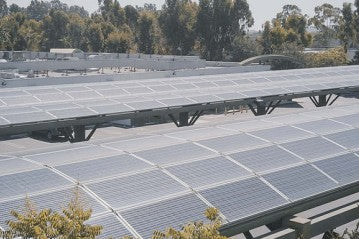
Solar power has gained immense popularity in recent years as a clean and sustainable energy source. As more people consider harnessing the power of the sun, questions inevitably arise about the components of a solar power system. One such component is the solar charge controller. However, a common misconception among potential buyers is whether a solar charge controller drains the battery. In this blog post, we aim to shed light on this myth and provide you, our valued customers, with accurate information to help you make informed decisions when purchasing solar energy-related products.
Understanding Solar Charge Controllers
To unravel the mystery surrounding solar charge controllers, let's begin by understanding their purpose and functionality. A solar charge controller is an essential device in a solar power system that regulates the flow of electricity between the solar panels and the battery. It acts as a traffic cop, ensuring that the battery is charged optimally and protected from overcharging.
Solar charge controllers come in different types, with the two most common ones being PWM (Pulse Width Modulation) and MPPT (Maximum Power Point Tracking). PWM controllers are suitable for small to medium-sized systems, while MPPT controllers are more efficient for larger systems. Both types perform the vital tasks of voltage regulation and preventing overcharging, ensuring the longevity of your battery.
Solar Charge Controllers: Energy Flow and Battery Drain
Now, let's address the burning question: Does a solar charge controller drain the battery? The simple answer is no. In fact, a solar charge controller is designed to protect your battery from overcharging and optimize its performance.
When sunlight hits the solar panels, they convert the sunlight into electricity, which is then sent to the charge controller. The charge controller regulates the voltage and current coming from the solar panels to match the battery's requirements. It ensures that the battery receives a steady and controlled charge, preventing overcharging and prolonging its lifespan.
Contrary to the myth, a properly functioning solar charge controller does not drain the battery. Instead, it acts as a safeguard, protecting the battery from damage caused by excessive charging or discharging.
How Solar Charge Controllers Protect Batteries
Let's delve deeper into the ways solar charge controllers protect batteries in a solar power system:
1. Overcharging Prevention: Solar charge controllers monitor the battery voltage and prevent it from reaching harmful levels. Once the battery is fully charged, the charge controller diverts the excess energy, effectively preventing overcharging.
2. Voltage Regulation and Battery Health Preservation: By maintaining a stable voltage, charge controllers ensure that the battery is charged within its optimal range. This regulation prevents undercharging or overcharging, which can significantly impact the battery's overall health and capacity.
3. Absorption and Float Charging Stages: Advanced charge controllers, particularly MPPT controllers, employ absorption and float charging stages. These stages further optimize battery performance by delivering the appropriate voltage and current levels during different charging cycles.
Enhancing battery lifespan and performance through proper charge control is the primary objective of solar charge controllers.
Factors Influencing Battery Drain in Solar Systems
While solar charge controllers do not drain batteries, it's essential to understand the factors that can contribute to battery drain in a solar power system:
1. System Losses: Efficient wiring, proper connections, and high-quality inverters can minimize energy losses within the system. By optimizing these elements, you can ensure that more energy is efficiently stored in the battery.
2. External Factors: Temperature and battery chemistry can influence battery drain. Extreme temperatures, both hot and cold, can impact the battery's capacity and overall performance. Similarly, different battery chemistries have varying discharge rates, which can affect the overall drain over time.
Selecting the Right Solar Charge Controller
When it comes to choosing the right solar charge controller for your system, several factors should be considered:
1. System Requirements: Determine the voltage and current ratings of your solar panels and the capacity of your battery. This information will help you choose a charge controller that can handle the power demands of your specific setup.
2. PWM or MPPT: Consider the size of your system. PWM controllers are suitable for smaller setups, while MPPT controllers are more efficient for larger systems with higher voltage panels.
3. Additional Features: Some charge controllers offer advanced features such as remote monitoring, programmability, and data logging. Assess your specific needs and budget to decide if these features are essential for your solar power system.
Conclusion
Solar charge controllers play a crucial role in ensuring the efficiency and longevity of your solar power system. It is important to understand that a properly functioning charge controller does not drain your battery. Instead, it protects your battery from overcharging and optimizes its performance, thereby enhancing its lifespan.
As you embark on your journey towards solar energy, make informed decisions by considering the factors discussed in this blog post. Remember to choose the right solar charge controller based on your system requirements and consult with professionals in the field for expert advice.
Embrace the power of the sun, and let solar charge controllers be your trusted ally in harnessing clean and sustainable energy for a brighter future.


0 Kommentare